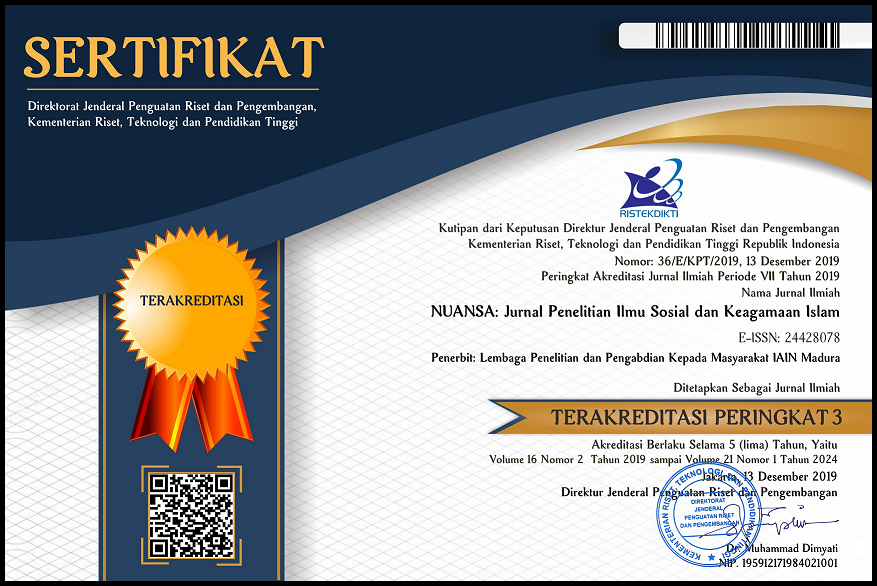FENOMENA SURROGATE MOTHER (IBU PENGGANTI) DALAM PERSPEKTIF ISLAM DITINJAU DARI HADIS
 Abstract views: 2151
,
Abstract views: 2151
,
 PDF downloads: 1062
PDF downloads: 1062
Abstract
As the time is gone, the practice of infant with infitro fertilization and artificial insemination have developed in some forms of activity which are forbidden in Islam. One of the forbidden forms is infitro insemination or artificial insemination which uses the sperm and ovum from a marriage couple and put it in another woman’s womb. This practice is called as Surrogate Mother.
Actually there is no verses in the al-Qur’an which strictly stated about the prohibition on the practice of infitro infant using another woman’s womb (Surrogate mother). But it does not mean that al-Qur’an does not give any solution and also guidance in solving the law of this problem. There are some syar’i theorems that can be used as references in the issue of surrogate mother, for example Q.S Maryam verse 3-5 which give us command to keep praying and trying to get descendents, Q.S al-Baqarah verse 223 which states that a wife is the best place for farming and also hadith of the prophet Muhammad SAW which forbid a man to give his sperm to another woman who is not their wife. Moreover, the practice of this surrogate mother is also contradictory with with al-maqasid al-shariah because it can cause a mixed Nasab.
Based on those reasons, the writer is interested in analyzing how is the surrogate mother phenomenon in the view of hadith and its contextualization dealing with the children’s position in the law of Waris (inheritance).
Based on the literature analysis done by the writer, it can be concluded that the practice of surrogate mother is forbidden according to Ulama because it gives more mudharat (negative effects) than Manfaat (Positive effect). The hadith used belongs to Hasan hadith with 48,9% percentage. While talking about the child’s position born through surrogate mother, they will be called as adopted children who substitute the position of their own children although they get the sperm and ovum from the real parents.
Downloads
References
Al Mas’udi, Hafid Hasan. Ilmu Musthalah Hadis (Surabaya: Darussalam)
Al-Munawwar, Said Agil Husin. 2004. Hukum Islam & Pluralitas Sosial. Jakarta: Penamadani.
Bustamin. 2004.Metodologi Kritik Hadis. Jakarta: Raja Grafindo Persada.
DEPAG. 2002. Al-Quran dan Terjemahnya ,edisi tahun 2002.
Hasan, M. Ali. 1998. Masail Fiqhiyah Al-Haditsah Pada Masalah-Masalah Kontemporer Hukum Islam. Cet. Ketiga. Jakarta: PT. Raja Grafindo Persada.
HS, Salim. 1993. Bayi Tabung: tinjauan aspek hukum. Jakarta: Sinar Grafika.
Huda, Miftahul.,dkk. 2015. Jabalkat: Jawaban Problematika Masyarakat. Kediri: ANFA’ Press
Karim, Helmi. 2002. Kedewasaan Untuk Menikah dalam Chuzaimah T. Yanggo dan Hafiz Anshary AZ, (ed), Problematika Hukum Islam Kontemporer,cet. ke-3. Jakarta: Pustaka Firdaus
Suryadi., Muhammad Al Fatih Suryadilaga. 2009. Metodologi Penelitian Hadis.n Yogyakarta: Teras Pres.
Al Islamiyah, Al-Alim Yusuf. Kaherah. Daral hadith. 2016. dalam Fadilla Caesa, Perspektif Hukum Islam dan Aturan Hukum yang berlaku di Indonesia terhadap Perjanjian Sewa Rahim dan Kedudukan Anak yang Lahir dari Sewa Rahim, dalam http://ejournal.unpak.ac.id diakses pada 16 oktober 2016 pukul 15.25 WIB.
Ferida, Kharisa. 2016. Kisah Pilu 3 Perempuan Tukang Sewa Rahim di Inda, http://global.liputan6.com/read/2577811/kisah-pilu-3-perempuan-tukang-sewa-rahim-di-india diakses tanggal 16 Oktober 2016 pukul 22.02
Nabahah, Radin Seri bt. Ahmad Zabidi. 2016. Penyewaan Rahim Menurut Pandangan Islam, dalam http://tibbians.tripod.com/shuib3.pdf, akses 10 Oktober 2016, hlm.2
www. library.islamweb.net
www.app.lidwa.com
The journal operates an Open Access policy under a Creative Commons Attribution-NonCommercial 4.0 International License (CC-BY-NC) 
Authors who publish with this journal agree to the following terms:
- Authors retain copyright and grant the journal right of first publication with the work simultaneously licensed under a Creative Commons Attribution License that allows others to share the work with an acknowledgement of the work's authorship and initial publication in this journal.
- Authors are able to enter into separate, additional contractual arrangements for the non-exclusive distribution of the journal's published version of the work (e.g., post it to an institutional repository or publish it in a book), with an acknowledgement of its initial publication in this journal.
- Authors are permitted and encouraged to post their work online (e.g., in institutional repositories or on their website) prior to and during the submission process, as it can lead to productive exchanges, as well as earlier and greater citation of published work.






















